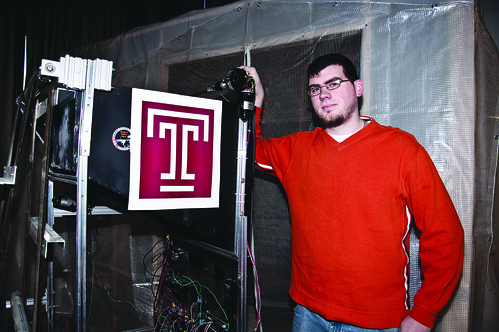
Joe Gro, a senior electrical engineering major, is the founder of Competitive Robotics At Temple Engineering, the competitive robotics team. Currently, he’s working on a senior design project, a non-invasive, brain-to-computer interface system for video gaming. He spoke with The Temple News about his passion for machinery and bringing the inanimate to life.
The Temple News: How did you first get into robotics?
Joe Gro: I got into robotics as a member of the [For Inspiration and Recognition of Science and Technology] robotics team. It’s a high school competition that’s held internationally. I was a member of [FIRST] in high school and what you do is actually build full-scale robots. They’re about 24 inches by 38 inches by 5 feet tall, and they’re designed to play certain games.
TTN: Moving to your senior design project, what is it exactly?
JG: My senior design project is actually not robotics related. We’re doing a non-invasive computer interface for video games. What that means is that we’re actually hooking a user up to the EEG machine and allowing them to play video games with their mind and only their mind, no other input.
It’s actually coming along pretty well. We’re using a pre-existing platform, called BCI2000. It’s an open source brain-computer interface platform, and then we actually filter the user’s signals and then output them into a dodgeball game.
The user is actually thinking about throwing the ball or moving around the dodgeball field and hitting a target. In addition to that, there’s a training option called a tactile feedback sensor. It’s a little vibration motor that’s hooked up to a microcontroller that actually vibrates when you’re targeting and thinking correctly. It’s training you, and it’s reinforcing that you’re doing well, and you’re playing the game correctly.
TTN: How did you get involved in that project when your interests seem to be in robotics?
JG: There weren’t a whole lot of robotics projects open at the time. Robotics for me has always been something that I do, and I mentor a lot of teams, so I’m always involved. The other senior design team that did robotics did the NASA Luna Robotics Competition. We did that last year just as a side project, and I didn’t want to go back and repeat myself.
I’m also a computer engineer, so I’m really interested in software and programming, and that’s what our entire project is revolving around. So my portion of the senior design project is programming the game itself. I’m building it up, all the 3D animation, the game incorporation, the handling functions and the reading in of the values coming from the user’s brain.
TTN: Is your team making good progress so far?
JG: We’re making a lot of progress. We had some issues at first; just coming into this project there was a very high learning curve. You have to learn BCI2000 and a lot of the back end information and that took a lot of time. In the past week, we’ve been testing on a user. As an application, we actually have them move the ball up and down with just their mind. That’s where we are currently, and we’re looking to expand into the game as soon as next week for the prototype demonstration.
TTN: With robotics and software as interests, what are you thinking of doing after graduation?
JG: Right now, I’m currently looking for a job. I want to get my master’s, but [first] I want to go into the work force for a little bit. This way I know exactly what I want to be. I’m looking currently at different positions. I applied at the Navy Yard in Philadelphia and down in Bethesda, [Md.] I’m looking at robotics companies as well because it’s something that I’m very interested in. I’m looking at iRobot in the Boston area, [and] there’s also a company called Chatten Associates. They do vision for iRobots – the actual headset cameras. But as an engineer, I’m not looking to limit myself to just robotics – it’s something I do as a hobby. I’m looking at all different types of engineering.
Nadia Elkaddi can be reached at nadia.elkaddi@temple.edu.


Be the first to comment